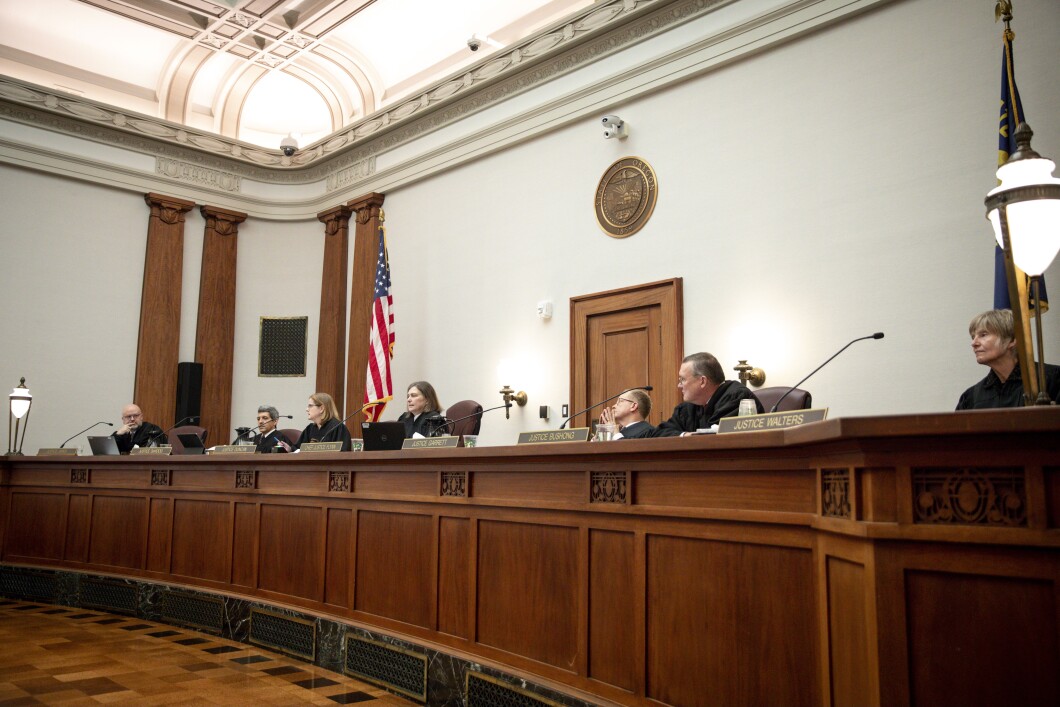
After a tumultuous year in the Oregon legislature, a federal judge ruled against a preliminary injunction from state Senate Republicans trying to get on the ballot next year, one step closer to disqualifying them from reelection due to excessive absences.
Republican senators who are barred from having their name on next year’s ballot sued to overturn Secretary of State LaVonne Griffin-Valade’s ruling upholding Measure 113 — a voter-approved law that bars state lawmakers who rack up ten or more unexcused absences in a single legislative session from running for election in the next term.
INFLATION FELL TO 2.6% IN NOVEMBER IN FED’S PREFERRED GAUGE
Voters added Measure 113 to the Oregon Constitution in an effort to prevent Republican walkouts, and it was tested for the first time in court this year when several state GOP Senators held the longest walkout in Oregon history to protest Democratic-backed legislation.
Around 68% of Oregon voters cast their ballot to change the state’s constitution in an effort to discipline lawmakers who participate in walkouts. Oregon Republicans both in the House and Senate have a history of boycotting Democratic-backed legislation. GOP lawmakers walked out in May 2019 to block a tax bill to fund state schools and again in June to prevent a cap-and-trade bill from passing. Republicans refused to come to work in 2020 to protest a climate change bill and led another walkout in 2021.

The latest boycott lasted six weeks, as the walkout began on May 3 when 10 senators refused to attend Senate floor sessions, claiming a number of Democratic bills were not written in plain language. Lawmakers cited a state law from 1979 that requires legislation to score above a 60 on the Flesch readability test, stating bills should be at an eighth grade or ninth grade reading level. The walkout ended on June 15, when Democrats agreed to make changes to bills regarding abortion and gun control.
However, the effects of the walkout lingered when Griffin-Valade pledged to uphold Measure 113 in August, noting her “decision honors the voters’ intent” of barring the members from seeking reelection after an excessive number of unexcused absences.
Five state senators who are up for reelection in 2024 are barred from putting their names on the ballot: Republican Minority Leader Tim Knopp, Republican Lynn Findley, Republican Dennis Linthicum, Republican Art Robinson, independent Brian Boquist, and Republican Bill Hansell. Hansell has opted not to launch a reelection bid.
Republicans issued a statement following Griffin-Valade’s decision, saying they will challenge it in court.
“After repeated unlawful and unconstitutional actions by President Rob Wagner and other Democrat leaders in the 2023 Session, Senate Republicans held them accountable by peacefully pausing the session to gain compliance with Senate Rules, Oregon Law, and the Oregon Constitution,” Knopp said in a press statement in August.
Attorneys representing Boquist, Hayden, and Linthicum said the walkout was a form of political protest protected by the First Amendment and therefore should not be punished. The senators’ legal team also argued marking their absences unexcused violated the 14th Amendment’s guarantee of equal protection under the law. They requested a preliminary injunction to block the secretary of state from keeping their names off the ballot.
U.S. District Court Judge Ann Aiken disagreed with their arguments, rejecting the preliminary injunction request on Dec. 13. Aiken wrote in her ruling that “these walkouts were not simply protests — they were an exercise of the Senator Plaintiffs’ official power and were meant to deprive the legislature of the power to conduct business.”
“The Oregon Constitution requires that each chamber of the Oregon legislature have a quorum of two-thirds of the members to conduct business,” Aiken added. “In recent years, the legislature has been intermittently paralyzed by walkouts in which members of the minority party absent themselves to deny the legislature a quorum.”
Despite Aiken’s ruling denying a preliminary injunction, the federal case can still move forward.
CLICK HERE TO READ MORE FROM THE WASHINGTON EXAMINER
The Oregon Supreme Court will rule on another case brought on by a different group of Republican lawmakers, including Knopp. That case focuses on the language of Measure 113, which attorneys argue was confusing. GOP lawmakers believe the language implies they can run for reelection in 2024, serving from 2025 to 2029, but can’t run in 2028.
State Republicans will try to get a decision in both cases before the March 12, 2023, deadline for candidates to file to run for office.



